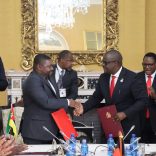Government and municipalities must solve people’s concerns
Mozambique: External debt service jumps 13% in three months

File photo: TVM
The cost of servicing Mozambique’s external debt increased by 13% in the third quarter of 2024, according to data from the Ministry of Finance that Lusa had access to yesterday.
According to the latest public debt bulletin from the Ministry of Finance, in that period the debt service increased to US$283.92 million (€274 million), including amortizations and interest.
In the third quarter of last year, Mozambique spent US$212.57 million (€205.5 million) on the principal amortization of external debt and US$71.35 million (€68.9 million) on interest payments.
“This amount represented an increase of US$31.82 million (€30.7 million), or 13%, compared to the second quarter of 2024,” the document reads.
In terms of interest on the “MOZAM 2032” Eurobond issue alone, which was derived from the so-called ‘hidden debts’, Mozambique paid US$40.37 million (€39 million) in interest over the same three-month period.
On the other hand, domestic public debt service in the same period amounted to a total of 54.8 million meticais, of which 45,844 million meticais (€692.8 million) corresponded to principal repayment and 8,962 million meticais (€135.4 million) to interest payments.
On Saturday, Mozambique’s new Finance Minister, Carla Alexandra Loveira, admitted the need to restructure public debt, warning that the country had lost revenues of almost €640 million during the post-election protests.
“One of the challenges we face, one of the main ones, is the management of public debt. The work we have to do is to reflect on and undertake in-depth work to restructure our debt, so that within that budgetary space we can ensure debt repayment, but also meet the current budgetary needs,” Loveira said after the inauguration of the new government in Maputo.
Carla Alexandra Loveira served as deputy minister of the economy and finance in the previous term and was chosen by the new President of the Republic, Daniel Chapo, to take on the role of finance minister.
The inauguration of the new government, whose prime minister is the former judge, minister of justice and presidential advisor Maria Benvinda Levi, took place after almost three months of violent demonstrations protesting the process surrounding the general elections of 9 October.
These protests, called by presidential candidate Venâncio Mondlane – who does not recognize the results, alleging “electoral fraud” – caused more than 300 deaths, with over 600 people suffering gunshot wounds.
“The indicators from the end of last year, which were presented to us, show that in December alone there was a loss of around 14 billion meticais [213 million euros] in revenue, resulting from the demonstrations. The entire year is expected to see a loss of revenue of around 42 billion meticais [€639 million]. Therefore, this loss of space ended up compromising last year’s financial year,” the new finance minister noted.
Mozambique only expects to approve the state budget by April of this year.
Carla Alexandra Loveira argued that it is necessary to increase economic growth in 2025. Growth for 2024 was estimated at 5%, but this is expected to be revised downwards due to post-election unrest and strikes.
“We want the entire economic recovery to happen in this financial year, so that there is capacity, availability, recovery, economic stability, so that economic activity can take place and also the returns from the raising of resources by the private sector can benefit the State Budget. Therefore, in this way we can ensure that the priority sectors are covered. That is our challenge,” Minister Loveira said.












Leave a Reply
Be the First to Comment!
You must be logged in to post a comment.
You must be logged in to post a comment.